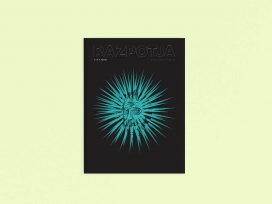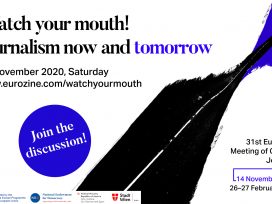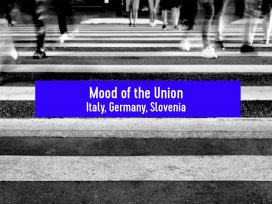The culture of hate in Slovenia has reached unprecedented proportions. It has been deserving of detailed analysis for some time now: it hangs over all of us invisibly and like a sickness saps our strength to resist it. We have agreed to its terms; it prevails everywhere, and not least of all is preparing to ascend onto the political stage. But in referring to the culture of hate I do not have in mind a particular external target against which its rage is directed. The current problem is not Croatians or the Roma or homosexuals or “the erased”. These were the favoured victims under the previous government, under Janez Jansa. No, the current target is us – the Slovenes.
The political speeches we hear are an unequivocal indicator of the poisoning of the political atmosphere. Their discursive characteristics again and again display the same elements of discreditation, insults, abuse, hatred and exclusion, stigmatization and demonization. The lying and manipulation, the chicanery of political opponents and blatantly compromised status of the media and journalists have never been so intense and frightening. The incomprehensible beastliness of anonymous postings in internet forums is hard to compare with anything found elsewhere in Europe – a foreigner reading it might well think they had entered a war zone.
Every day, the largest right-wing opposition party rushes to smear anyone who dares to criticize the trend: journalists, commentators, experts. Their ad hominem attacks have overwhelmed every attempt at serious discussion and judgment. The alarming nature of the hate is magnified by the practice of awarding ironic journalistic prizes by which the same people malign and ridicule journalists and commentators on a weekly basis. This practice is hard to find elsewhere since journalist associations would try to put a stop to it. Not so in Slovenia: on the contrary, esteemed journalist associations even actively participate in these pogroms. Even worse, there are ever expanding lists of people who are not “us” published on the websites of political parties. It seems that all this hatred and the Manichean division into “us” and “them” – which originates primarily from the ranks of the opposition parties and the media that are favourably inclined towards them – have a single goal: the collapse of the ruling government, and its replacement by one in which they would like to instate themselves.
And it appears that there exists an Enemy which must be fought against and completely annihilated.
That the ruling coalition headed by Borut Pahor has committed a series of errors and should resign is doubted by no one. The coalition itself admits it. But what is dubious is the hostile arguments presented as a reason for the government to step down. The impression has been created that the discreditation, the interpretive distortion of events, are in fact accurate.
Certainly the approach is highly successful, as indicated by the public support. If the goal of the Norwegian criminal Anders Breivik was a “hunt for Marxists” and the punishment of his own nation so that it would finally heed the warning about the supposed Islamization of Norway, here in Slovenia we can witness a “hunt for Communists”. The obsession with communism, which ceased to exist at least 20 years ago, is on the increase: conspiracy theories, discoveries of the “Udbomafia”, “Kucan’s clan”, the “transition left” and enemy “networks” have gone beyond the political project of gaining power, to a greater psychological goal guided by a paranoid style of thinking.
Many close their eyes to what is happening and reassure themselves that it is legitimate behaviour in politics. Somewhat Machiavellian, perhaps, but the desire for power is not a sin but a goal. Perhaps they even believe that after their enthronement, the pressure will let up and the hatred will suddenly evaporate. I am certain that they are mistaken. As are those who resignedly conclude that Slovenia is just a country where the rise of conservative right-wing parties is an unavoidable given and nothing can be done to stop it. As if we must somehow just accept the spirit that has dominated Europe and is stronger than all of us!
In the Slovenian situation, due to the current leadership crisis of the leftist government, we frequently hear spontaneous assessments about the “hysterical nature” of the political climate here. This expression has also been used many times by the president. But this description is too optimistic and imprecise. Hysteria is a neurotic state and not a psychotic mental disorder. But psychosis is a serious illness, and social paranoia is a good example of this. Characteristic of neurotics is that they preserve a sense of reality even though their thinking is bothered by it. If you have to wash your hands 100 times a day, you are obsessive, but you have not yet lost touch with the real world because of it. Psychosis, on the other hand, means losing touch.
In the last year we have heard countless times that the government has done just that – lost contact with reality – and the right-wing opposition is correct in this respect. But what it has forgotten to mention is that evil is already present in the one who calls others evil. We are all of us losing touch with reality.
The British psychoanalyst Darian Leader provided a good description of Breivik’s compatibility with normal life. He lived an entirely ordinary life, attended university, set up a business, went to the gym, and never needed psychiatric attention. Paranoia and normal life can be maximally compatible – there are no particular symptoms. But his paranoia nevertheless contained the three classical components: he identified a malignancy in the world, he gave it a name, and he offered a “solution”. Breivik’s conviction is that Europe is rotten, that the name of this rottenness is Islam, and that the solution to the problem is Islam’s exposure and expulsion. In Slovenia the situation is very similar: the leader of the opposition has discovered evil in Slovenia, its name is communism, and the solution to all our troubles is its final eradication. Or as he wrote in the spirit of the communist conspiracy which he perceives everywhere: “The holy water sprinkled on members of the chosen transition elite is not clear but coloured red. It is blood.” His reaction to the “lies” that are exposed daily in the media is always the same. “The lie is the immortal soul of communism.” That there has been no communist party in Slovenia for at least twenty years, and even fewer who would support communist ideology, is apparently entirely beside the point.
Not long ago, Dialogi issued a special international issue devoted to culture and political paranoia, available in English and Slovene. The Norwegian and Slovenian cases are certainly not isolated instances, but we do not give sufficient attention to paranoid thinking and its presence in a multitude of aspects of human life, let alone try to stop it. We’ve been hearing a lot these days the question of whether a Breivik-type attack could also occur in Slovenia. Responses vary, but the most important one is absent from the discourse: it can’t happen here, since we have no need for it. Because we already have something almost as horrible: a widespread culture of hate, anticommunism and paranoia hammering away in all corners and killing us slowly.






